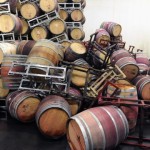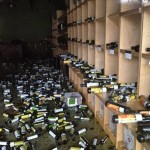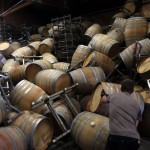The center of the US wine industry was also the center of something else this weekend – a 6.1 earthquake, and reports suggest that quake losses could reach $4 billion.
To a wine lover, the news and photos from the early morning tremor on August 24 are gut wrenching. Cellars of world-class wine toppled and broken; barrels collapsed and in unmanageable heaps; and wine literally spilling into the streets.
- via cnn.com
- via sfgate.com
- via sfgate.com
The Napa area is also just about to head full speed into its annual harvest season; having wineries in need of repair and employees in need of time off to address their own personal property damage is poor timing as far as when the ideal time for a earthquake to occur is.
The silver lining in all of this, or course, is that the earthquake took place at 3:20 AM. The earthquake could have easily come at 3:20 PM when there would surely have been be many hard-at-work people in the numerous wineries hit hard by the prolonged shaking. According to Napa Valley Vintners, there were no reports of winery employees being injured; in contrast, there likely would have been casualties had the earthquake happened at any other time besides the middle of the night.
Our Passion is the People
Our goal here at Craft Beverage Jobs is to help passionate people find meaningful work in craft beverage – be that wine, craft beer, distilled spirits or other artisan beverage products. Our passion is the people. While we hate hearing about damage to a winery or loss of wine, our main concern is the impact the earthquake is having on employees of the wineries, those who work to support the industry, and just everyone in the community.
Ways to Support the Community
Visit Napa Valley
Napa is open for business, and its wineries, restaurants, shops, and hotels want you to visit. Spending your money locally will help keep people employed. If you are curious about visiting a winery, just give them a call ahead of time to see if they’re open and/or have modified hours or locations.
Tip the Workers
And when you visit, be patient with, and leave a generous tip for, your service workers. These good folks are likely the ones who will feel the financial pain of the earthquake the most. Wineries are insured for loss so are more than likely covered. According to this Huffington Report piece, over 90% of area residents do not have earthquake insurance due to unaffordable premiums. While your supporting the local businesses will help these people stay employed, many residents will be faced with large out of pocket expenses.
Give to the Local Food Bank
According to the Napa Valley Vintners website, the local food bank is extremely low on food. They are requesting donations of non-perishable food items like canned tomatoes, canned fruit and canned protein.
If you are in the area, you can drop off a donation at the warehouse: 1766 Industrial Way, Napa (M-F 7:30am – 3pm)
If you are not able to drop off food, but would like to make a monetary donation to the food bank, you can do so by calling 707.253.1628
Buy Direct from a Winery Website
If you cannot visit Napa and the area to support the local economy, and you are allowed to receive shipments of wine where you live (see this map to find out if you can), consider making all of your upcoming wine purchases directly from a winery’s website.
Buying direct yields the highest return for a winery, and while they would always like you to purchase directly from them, doing so now is especially helpful.
The Big Picture
The Napa wine industry is resilient. Just as it has to adapt to various growing conditions year-in and year-out, or adapt to disease, or economic flux, the industry will adapt and overcome the hurdles presented by the affects of this earthquake so long as the focus remains on supporting the people.
And other wine growing regions are the same. The New York Finger Lakes wine region just experienced a crippling 2013-2014 winter, and the area was declared a “disaster zone” because up to 100% of some of the area vineyards were severely damaged by prolonged freezing temperatures.
As long as the people are supported, paid an appropriate wage, and are appreciated by visitors, the people who work in the wine industry will remain loyal, passionate and strong – and that will be what keeps the industry going strong.



